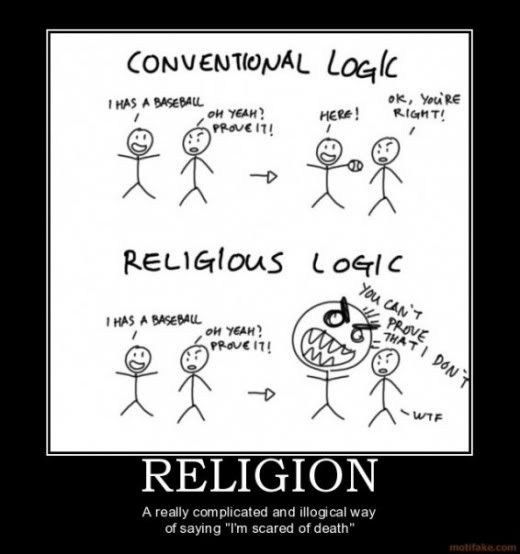The thing is Indigo, most atheists genuinely believe that religion is bad for society. At first glance it would seem that a number of injustices and wars were made because of religion. Usually though, religion is just used as an excuse, a way to control people and incite their passions. This says nothing about the actual truth of the religion, merely its effects on society. But if religion didn't exist, I'm nearly certain people would become "fanatics" about something else.
So, lets let them continue killing each other over religion? I don't see the point. It's like saying why bother curing malaria, people will just die by a different disease. If you are able to eliminate one cause, it is worthwhile to do so. If people fight over economic, political, etc. problems, I think it is worthwhile to eliminate those problems as well. To say that people will become fanatic about something else once these problems have been eliminated is incorrect evident by the societal health of the Scandinavian countries.
Religion shouldn't be held accountable for man's desire to say "I'm right and you're wrong".
OK, but I will hold it accountable when it's holy book tells believers to "strike off their heads and strike off every fingertip of them (referring to unbelievers)." and then the followers do so because their "god's word" told them to. Its one thing to be in the wrong, its an entirely different thing to advocate intolerance and violence.
And what's so wrong with people saying "I'm right and you're wrong," that is, as long as they provide sufficient reason or evidence to show that the they are correct and the other person is wrong. The problem with religion is that the latter is not included in the discussion, it literally falls flat on its face in trying to support itself with reason. Religion should be held accountable when its adherents hold to a dogmatic view and cause harm by it.
And I don't fully share your sentiment that man has a desire to say "I'm right and you're wrong." I don't mind if someone tells me that I'm wrong, as long as they also give sufficient evidence and reason for their claim. That way, instead of being wrong this one time, I can be right in the future, and it also increases my knowledge, which makes my decisions based on more accurate information. This is another fault of religion, it claims "I'm right and I can never be wrong;" with such resistance to change, it is unlikely for its adherents to be swayed by physical evidence and reasoned logic.
In fact you've already noticed how militant atheists act like religious fundamentalists, with their intolerance, insults, closed-mindedness, etc.
Intolerant? Examples are needed. The "new" atheists are in no way intolerant, criticism is not intolerance. Closed minded? Examples are needed. As for insults, they go both way, but are no way more prevalent on the atheist side, I suggest you learn to ignore them.
Kevin, the rule can be applied to our universe: if it was not created, there must be some way to create matter and energy from nothing. Modern understanding of physics overwhelmingly indicates that this is not the case. There should be evidence for it if it's possible, but there is none.
Why must there have been nothing? If by understanding physics, you mean understanding the Big Bang Theory, then you must know that at the Planck time, there was a singularity, and not nothing. So, what evidence do you have that there was nothing? I'll answer the rhetorical by saying, we know nothing before the Planck time, so trying to answer such a question is beyond the ability of anyone at this time and the laws of physics most likely break down at said time. By the way, there are several hypothesizes of how energy can come from nothing (
http://www.youtube.com/watch?v=7ImvlS8PLIo). Basically, the sum of the energy in the universe is zero, meaning that it can come from nothing. "If you have nothing in quantum mechanics, you'll always get something." Its still very much an open question and to say otherwise is against the modern understanding of physics.
Also, abs. of ev. may be ev. of abs. but it isn't proof.
Who said anything about proof? Proof is really only applicable to mathematical models, in the real world, we use evidence to support claims.


 ) . This was a really good idea for a blog and it stands to the testament of the versatility of religious discussion.
) . This was a really good idea for a blog and it stands to the testament of the versatility of religious discussion.
